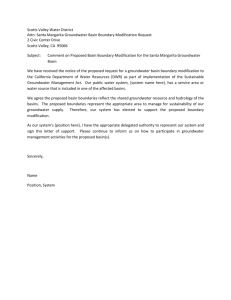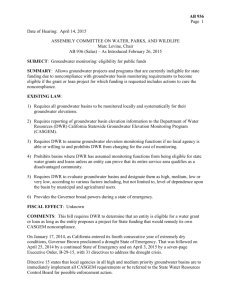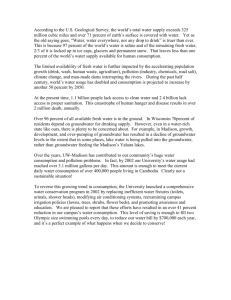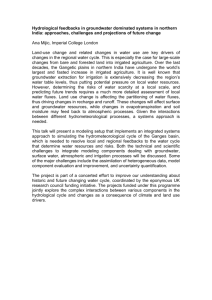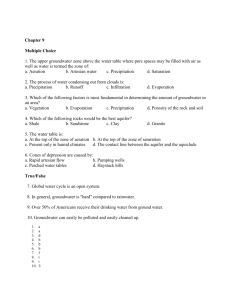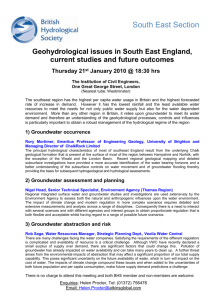assembly floor analysis
advertisement
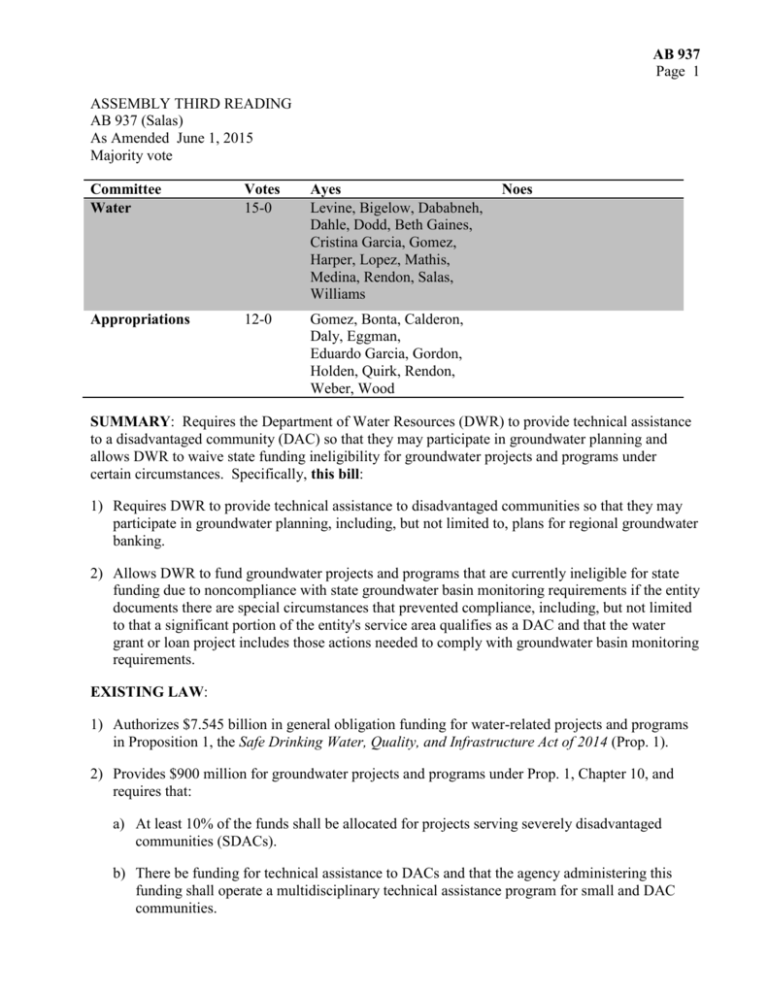
AB 937 Page 1 ASSEMBLY THIRD READING AB 937 (Salas) As Amended June 1, 2015 Majority vote Committee Water Votes 15-0 Ayes Levine, Bigelow, Dababneh, Dahle, Dodd, Beth Gaines, Cristina Garcia, Gomez, Harper, Lopez, Mathis, Medina, Rendon, Salas, Williams Appropriations 12-0 Gomez, Bonta, Calderon, Daly, Eggman, Eduardo Garcia, Gordon, Holden, Quirk, Rendon, Weber, Wood Noes SUMMARY: Requires the Department of Water Resources (DWR) to provide technical assistance to a disadvantaged community (DAC) so that they may participate in groundwater planning and allows DWR to waive state funding ineligibility for groundwater projects and programs under certain circumstances. Specifically, this bill: 1) Requires DWR to provide technical assistance to disadvantaged communities so that they may participate in groundwater planning, including, but not limited to, plans for regional groundwater banking. 2) Allows DWR to fund groundwater projects and programs that are currently ineligible for state funding due to noncompliance with state groundwater basin monitoring requirements if the entity documents there are special circumstances that prevented compliance, including, but not limited to that a significant portion of the entity's service area qualifies as a DAC and that the water grant or loan project includes those actions needed to comply with groundwater basin monitoring requirements. EXISTING LAW: 1) Authorizes $7.545 billion in general obligation funding for water-related projects and programs in Proposition 1, the Safe Drinking Water, Quality, and Infrastructure Act of 2014 (Prop. 1). 2) Provides $900 million for groundwater projects and programs under Prop. 1, Chapter 10, and requires that: a) At least 10% of the funds shall be allocated for projects serving severely disadvantaged communities (SDACs). b) There be funding for technical assistance to DACs and that the agency administering this funding shall operate a multidisciplinary technical assistance program for small and DAC communities. AB 937 Page 2 3) Requires DWR to evaluate groundwater basins and designate them as high, medium, low or very low, according to various factors including, but not limited to, level of dependence upon the basin by municipal and agricultural users. 4) Requires that local agencies in high- and medium-priority groundwater basins subject to the Sustainable Groundwater Management Act (SGMA) form one or more local Groundwater Sustainability Agencies (GSAs) by June 30, 2017, in order to develop and implement Groundwater Sustainability Plans (GSPs) that provide for the sustainable management of the groundwater basin or subbasin, as defined. 5) Requires that GSAs in basins with chronic overdraft develop and adopt GSPs for their basin or subbasin by January 31, 2020, and that all other high and medium priority basins subject to SGMA develop and adopt GSPs by January 31, 2022. 6) Authorizes the State Water Board to declare a basin in probationary status and adopt an interim plan for a basin, subbasin, or portion of a basin or subbasin, if deadlines are not met, as specified. 7) Requires all groundwater basins to be monitored locally and systematically for their groundwater elevations. 8) Requires reporting of groundwater basin elevation information to DWR's California Statewide Groundwater Elevation Monitoring (CASGEM) program. 9) Requires DWR to assume groundwater elevation monitoring functions if no local agency is able or willing to and prohibits DWR from charging for the cost of monitoring. 10) Prohibits basins where DWR has assumed monitoring functions from being eligible for state water grants and loans unless an entity can prove that its entire service area qualifies as a DAC. FISCAL EFFECT: According to the Assembly Appropriations Committee: 1) Unknown costs for DWR to provide local assistance to disadvantaged communities, potentially in the millions of dollars (General Fund or special fund). 2) Minor to moderate increased staff costs for DWR, likely in the $100,000 to $150,000 range, to evaluate applications to determine if the grant request would result in compliance with groundwater basin monitoring functions. COMMENTS: This bill would require DWR to provide technical assistance to DACs so that they may participate in groundwater planning, including banking, and would authorize DWR to fund some previously ineligible local groundwater plans and programs upon the requisite showing. The author states this bill is needed to help DACs, including in circumstances where denying CASGEM noncompliant basins state funding is having the negative consequence of preventing local agencies from receiving much needed water grants and loans in order to set up groundwater monitoring programs. Other supporters state that many small and rural counties have limited staff and resources to implement new and ongoing programs proscribed by the state and that this bill would ensure necessary funding is available to bring more entities into compliance with the CASGEM program. AB 937 Page 3 This bill could help DWR to establish a DAC assistance program similar in some ways to the program created at the State Water Resources Control Board (State Water Board). The State Water Board has established a technical assistance office for disadvantaged communities, the Office of Sustainable Water Solutions (Office). The Office's purposes include, but are not limited to: providing assistance, including technical assistance, to small drinking water systems and disadvantaged communities without clean, safe, and reliable drinking water or wastewater treatment systems; promoting and facilitating regional drinking water solutions and wastewater projects; and advancing the delivery of affordable, safe, drinking water throughout the state. The Office was established through AB 92 (Budget Committee), Chapter 1, Statutes of 2015, as part of the 2015 Emergency Drought Legislation. The Office was created in recognition that the drought is affecting many disadvantaged communities, some with shallow wells that are going dry, are impaired by contamination, or both, and who may lack the technical assistance to develop and implement long-term solutions. The need to address CASGEM noncompliant basins is more acute due to drought. On January 17, 2014, as California entered its fourth consecutive year of extremely dry conditions, Governor Brown proclaimed a drought State of Emergency. That was followed on April 25, 2014, by a continued State of Emergency and on April 3, 2015, by a seven-page Executive Order, B-29-15, with 31 directives to address the drought crisis. Directive 15 states that local agencies in all high and medium priority groundwater basins are to immediately implement all CASGEM requirements or be referred to the State Water Resources Control Board for possible enforcement action. There are currently 127 high and medium priority basins in California. Those groundwater basins account for 96% of all groundwater use. Of the high and medium priority basins, DWR has determined that 9 are fully unmonitored and 16 are partially unmonitored. In other words, 102 are currently CASGEM compliant and 25 are noncompliant. In the 25 non-compliant basins, local agencies can still be eligible for a water grant or loan if their whole area is a disadvantaged community. That is because it is assumed that the bar to compliance is that the entity's customers are financially incapable of supporting a monitoring program. Analysis Prepared by: Tina Leahy / W., P., & W. / (916) 319-2096 FN: 0000801

